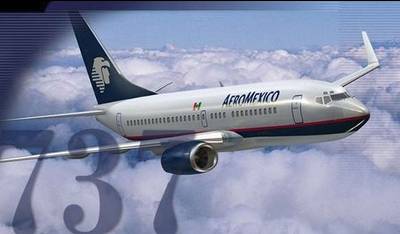Across The Pacific, Boeing Joins Forces With Hawai'i Bioenergy
Looking At Sorghum And Eucalyptus
AeroMexico is flying daily passenger service on its Mexico City
to San Jose, Costa Rica route using Green Jet Fuel, a trademarked
brand produced using process technology from Honeywell's UOP. The
airline says it is one of the first uses of renewable fuels in
everyday airplane passenger service.

The move is part of the airline's "Green Flights" project
designed to reduce greenhouse gas emissions. The
Aeromexico-operated Boeing 737-700, which carries up to 124
passengers, will use a 15 percent blend of Green Jet Fuel made from
the inedible plant camelina and petroleum-based fuel. Mexican
agency Aeropuertos y Servicios Auxiliares (ASA) blends Green Jet
Fuel with petroleum-based fuel. The agency has developed its
"Flight Plan towards Sustainable Aviation Biofuels in Mexico,"
program which is focused on identifying and analyzing the elements
of the supply chain of aviation biofuels in Mexico.
"This regular commercial route powered by Honeywell Green Jet
Fuel is a huge step in establishing the market for aviation
biofuels and widespread use of these fuels," said Jim Rekoske, vice
president and general manager of Renewable Energy and Chemicals for
Honeywell's UOP. "With the addition of this route, Aeromexico and
ASA are helping make cleaner air travel from non-fossil sources a
reality for everyone."

Honeywell's UOP process technology produces Green Jet Fuel from
natural oils and wastes. The fuel meets all specifications
for flight and, when used in a 50-50 blend with petroleum-derived
jet fuel, is a drop-in replacement that requires no changes to the
aircraft or engine. According to ASA, the Mexican aviation sector
expects biofuels to account for 1 percent of the fuel used in
Mexico by 2015 and 15 percent by 2020.
Across the Pacific, a collaborative agreement between Hawai'i
BioEnergy and Boeing announced Thursday will look at various crops
including sorghum and eucalyptus as potential sources that can be
grown locally and converted to jet fuel. The collaboration will
also look to assess new supporting technologies for aviation
biofuel production. Announced on the eve of the Asia Pacific
Economic Conference (APEC) CEO Summit, the memorandum of
understanding highlights how the companies will work together to
identify biofuel sources and supporting technologies for producing
sustainable jet fuel in Hawaii.

"As an Asia Pacific gateway and leading tourism destination,
Hawaii can play a meaningful role in helping aviation reduce carbon
emissions, while increasing regional energy resources," said Boeing
Commercial Airplanes Vice President of Environment and Aviation
Policy Billy Glover. "This collaborative effort will allow us to
examine potential local options, while protecting the beauty and
culture these islands have to offer."
Being an island state with a strong U.S. military presence and a
dependency on imported energy, Hawaii's bioenergy development
initiatives can help create new regional resources, while providing
a boost to the local economy. Hawai'i BioEnergy, which is at the
forefront of the development of a biofuels industry in Hawaii, is a
leading renewable energy supplier to the Hawaiian Electric Company
and well-positioned to co-lead the local aviation biofuel
effort.
"We are looking forward to working with Boeing in addressing
Hawaii's energy needs, particularly for aviation fuel," said
Hawai'i BioEnergy's Chief Operating Officer Joel Matsunaga. "We
have the opportunity to shape a more sustainable energy future for
our children and generations to come in Hawaii while creating
economic growth for the State."
 ANN's Daily Aero-Term (05.07.25): Terminal Radar Service Area
ANN's Daily Aero-Term (05.07.25): Terminal Radar Service Area ANN's Daily Aero-Linx (05.07.25)
ANN's Daily Aero-Linx (05.07.25) Classic Aero-TV: Anousheh Ansari -- The Woman Behind The Prize
Classic Aero-TV: Anousheh Ansari -- The Woman Behind The Prize NTSB Prelim: Bell 206B
NTSB Prelim: Bell 206B Airborne-NextGen 05.06.25: AF Uncrewed Fighters, Drones v Planes, Joby Crew Test
Airborne-NextGen 05.06.25: AF Uncrewed Fighters, Drones v Planes, Joby Crew Test





